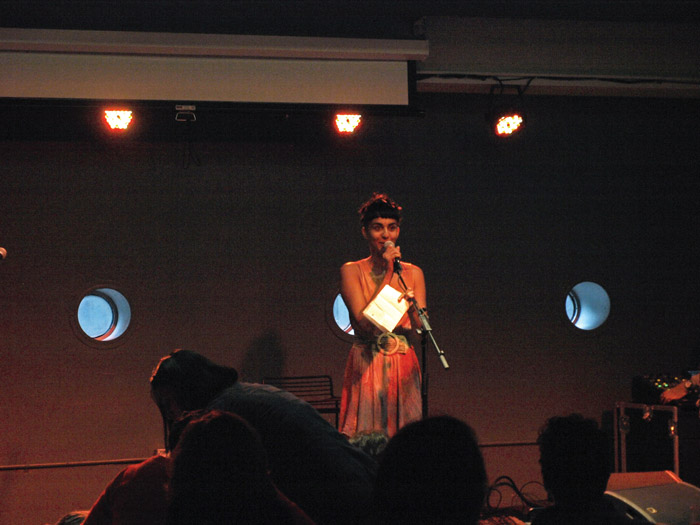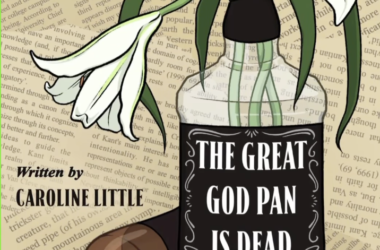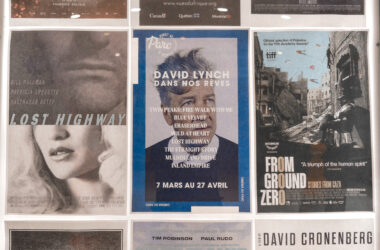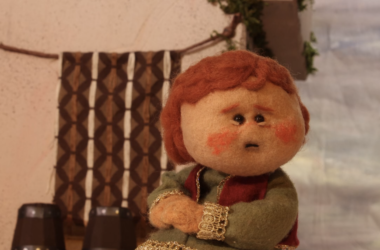Successful comedy comes from a place of heartbreak, and from the ability to make what seems devoid of humour funny. The stereotype is that feminists aren’t funny, but by that token, feminism should be a breeding ground for good comedy. Comedy greats like Louis C.K. and Chris Rock base their routines around obstacle, heartache, and depression—but where are these themes more apparent than in a woman’s struggle to exist amongst her male counterparts? At the Concordia Centre for Gender Advocacy’s “Feminist Stand-Up Comedy Night,” headliner Ify Chiwetelu proved that nothing is funnier than a poignant and witty take on systemic oppression.
The event was hosted in Concordia’s student bar, Reggie’s. With its open floor plan, dimmed orange lighting, and geometric wire seating, both the space and its inhabitants were uniformly trendy. While atypical for a comedy show, the location was actually fitting for the evening. Despite the help from talented performers and a unique venue, the Centre for Gender Advocacy was ill-prepared for a comedy show. The event featured five amateur performers for its open mic portion, followed by an experienced stand-up comedian to conclude the show. The Centre’s Action Coordinator, Stacey Gomez, acted as MC, and was proficient in carrying out her duties as an equality advocate and in creating a safe space for both performers and audience alike. However, she was not a comedian. Often overlooked, a host plays a crucial role in interacting with the audience in between acts, and the absence of a comedian as host set an uneasy tone for the evening. Similar structural flaws followed; one comedian even showed up late and performed after the headliner. The show was a learning experience for the five amateur comics performing, and the Centre for Gender Advocacy.
Headliner Ify Chiwetelu, who Bad Dog Theatre named their Breakout Performer in 2015, expertly navigated the show back into more comfortable comedic territory. Chiwetelu, who described growing up black in a predominantly white Calgary neighborhood, recalling the microaggressions that crowded her childhood in a way that was both heartbreaking and hysterical.
“My friends always asked me to bring them to black events,” she remembered. “I wanted to call them and bring them to the bank to talk about RSPs. Every event I do is a black event!”
She explored more personal terrain, explaining her reluctance to reveal her sexual orientation with self—deprecating wit: “I still haven’t figured out where on the spectrum being dead inside is.”
Chiwetelu’s retelling of her experience with blackness, womanhood, and sexuality fit the evening’s activist tone without pandering to the audience. She did not limit herself to being a token “black woman comedian.” Her act was populated with random day-to-day observations, ranging from what it is like to have large breasts (“I’m talking mid alphabet”), to being single (“PDA feels like a personal attack”). Many of her colleagues spent their time on stage describing the hardships women face. Yet unlike her counterparts, Chiwetelu did not need to explain to her audience why 'women aren’t funny' is a ridiculously outdated sentiment—her routine was proof in and of itself.
Even if the show was logistically somewhat amateur, it was still successful. As Chiwetelu explained after her performance, “I feel like some comedy audiences self-select themselves out of comedy clubs and things like that because they think they might be made fun of or attacked. By saying this is a feminist show, you’re speaking to those audiences and bringing them a comedy that aligns with their politics and their viewpoint.” The Centre for Gender Advocacy will only improve by continuing to host similar events, showcasing performances that are so important to fans of alternative comedy.










Wow, did you wake u on the wrong side of the bed?